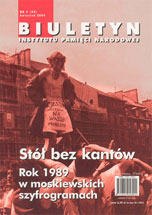

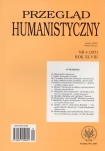
Krzemieniec. Ateny Juliusza Słowackiego. Pod red. S. Makowskiego, Biblioteka Narodowa, Towarzystwo Literackie im. Adama Mickiewicza, Wydział Polonistyki Uniwersytetu Warszawskiego, Warszawa 2004, „Українська школа” в лiтературi та культурi українсько-польського пограниччя, Київськi полонiстичнi студiї, Збiрник наукових працъ, t. VII. Pед. Р. Радишевський, Київ 2005 Displaced Cultural Assets. The Case of Western Europe and the problems of Central and Eastern European Countries in the 20 Century. Ed. G. Czubek and P. Kosiewski, Stefan Batory Foundation, Warsaw 2004, S. Kozak, Polacy i Ukraińcy. W kręgu myśli i kultury pogranicza. Epoka romantyzmu, WUW, Warszawa 2005 W. Mańczak, Przedhistoryczne migracje Słowian i pochodzenie języka staro-cerkiewno-słowiańskiego, Polska Akademia Umiejętności, Kraków 2004 Witold Mańczak, Pochodzenie języka staro-cerkiewno- -słowiańskiego a Kodeks zografski, Warszawa 2006, w serii Semtosis Lexicographica, vol. XXVIII, Inst. Lingwistyki Stosowanej UW A. Mieszkowska, Marian Hemar. Od Lwowa do Londynu, Polska Fundacja Kulturalna, Londyn 2001 D. Matelski, Problemy restytucji polskich dóbr kultury od czasów nowożytnych do współczesnych. Archiwa — księgozbiory — dzieła sztuki — pomniki, Dom Wydawniczy Harasimowicz, Poznań 2003
More...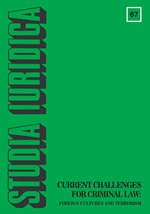
Keywords: Polska Ludowa; prace naukowe; artykuły; bibliografia
More...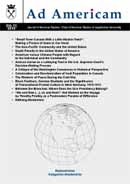
This paper concentrates on the socio-cultural aspect of American-Chinese relations, viewed from the perspective of the “Great Wall” concept. The “Great Wall” is a particular visualization of these relations as well as a reason for examining China and the United States in the category of competitive symbols of the East and the West. This idea is often expressed by antagonistic cultural values, most clearly observed in the American and Chinese approaches to the importance of the individual and the community. The author analyzes American society as the embodiment of individualism, which at the same time situates the independent individual in the context of his or her need to belong to some larger community, represented either by the family or some other social organizations. Chinese society has been presented through the angle of Confucianism – a system which developed the cult of the family and collectivism, but did not appreciate the individual. The author has also outlined the contemporary process of gradual elimination of the traditional order in favor of the growing individualism of the youngest generation of Chinese. The causes and effects of cultural differences between China and America have been presented, with the conclusion that in the days of globalization the thus far conflicting approaches are undergoing a the process of far-reaching transformation through mutual adaptation of new values. Thus, the idea of diametrically opposed vision of Chinese and American society is becoming less and less justified.
More...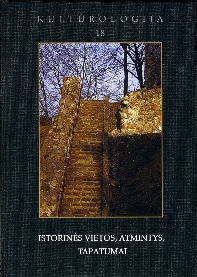
Keywords: Antiquity Vilnius museum; Lithuanian National museum; inheritance, wardship of museum
The article examines the main trajectories and contingency from Antiquity Vilnius museum until Lithuanian National museum. The author investigate the link of inheritance‘s values of museums and priorities of wardship in the historical continuity.
More...
The article analyzes the phenomena of collaboration and collaborationism in all territories incorporated into the Third Reich. Nowhere, apart from a specific situation in Luxembourg, one may find in those territories national collaboration, that is to say the creation of state institutions collaborating with the Germans. The reason was the lack of initiative on the part of Germans. All territories incorporated into the Reich were treated offi cially or unofficially as parts of the Third Reich, and that is why the possibility to create there state semi-sovereign institutions was not planned. The support of collaboration in the annexed territories looked different. Simultaneously when integrating with the Reich the attempts were made to develop collaborative attitudes by Nazifi cation. The process of Nazification was very unequal and was taking place differently in every analyzed territory. In the Polish incorporated territories the process of establishing the Nazi Party (National Socialist German Workers Party) and transmitting organizations were nearly instantly being initiated. They acquired members nearly solely from the circle of the representatives of the pre-war German minority members who were politically active before 1939. The membership in the Nazi Party was elitist in the east and amounted to 2–3 per cent. In the west the intermediary solution was adopted, that is to say – the national socialist movements were being created which constituted the step in the path to the membership in the Nazi Party. The membership in those organizations in Luxembourg, Alsace and Lorraine was a mass scale phenomenon, and was not restricted by ‘racial’ limitations. After the end of the war, there were no precise criteria how to differentiate between the collaboration attitudes in the incorporated territories from those which are described as adjustment and passive and active resistance. It resulted in accusing a large part of the native population of collaboration without differentiation between that group and the German minority which in fact participated in that process on a mass scale. The indicator factor of collaboration in the eastern territories was rather the membership in Nazi organizations, than the active engagement in the activities of the German state apparatus, party structures and terror apparatus.
More...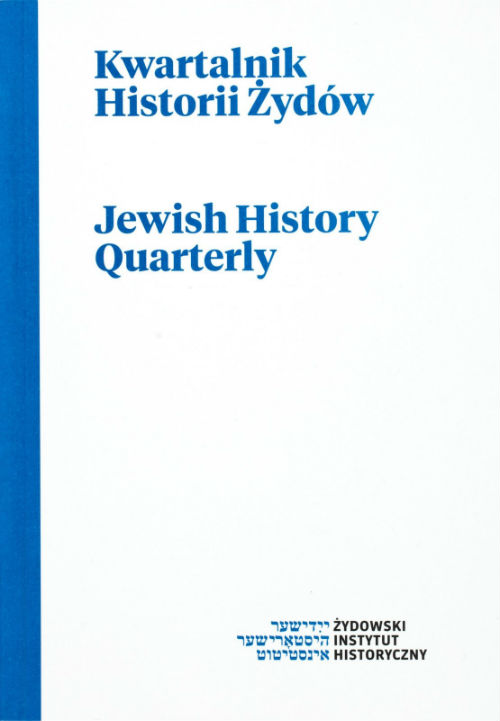
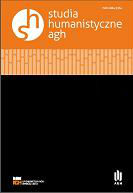
Keywords: national minority; ethnicity; Poland; theories; methodology
In the last quarter-century many works on ethnic relations and the situation of the various national and ethnic groups in Poland have been published. We may still talk about the strong and visible development of ethnic studies in our country with the participation of both sociologists and anthropologists (ethnologists), as well as representatives of other social sciences: historians, political scientists, lawyers, etc. An overview of publishing and institutional achievements concerning national minorities in Poland shows that the issue of ethnicity in social reality has been heavily exploited by sociology. On the other hand, a real challenge remains considering the shortage of: cross-sectional publications of the entire range of ethno-linguistic diversity of Polish society and its individual groups; studies linking ethnic studies with the important theoretical issues; and work defining sociological research in this field for the next decade, as in Antonina Kłoskowska’s book Kultury narodowe u korzeni.
More...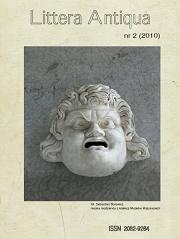
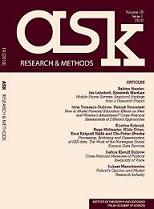
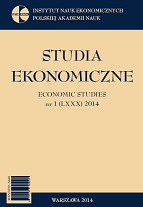
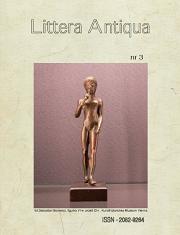
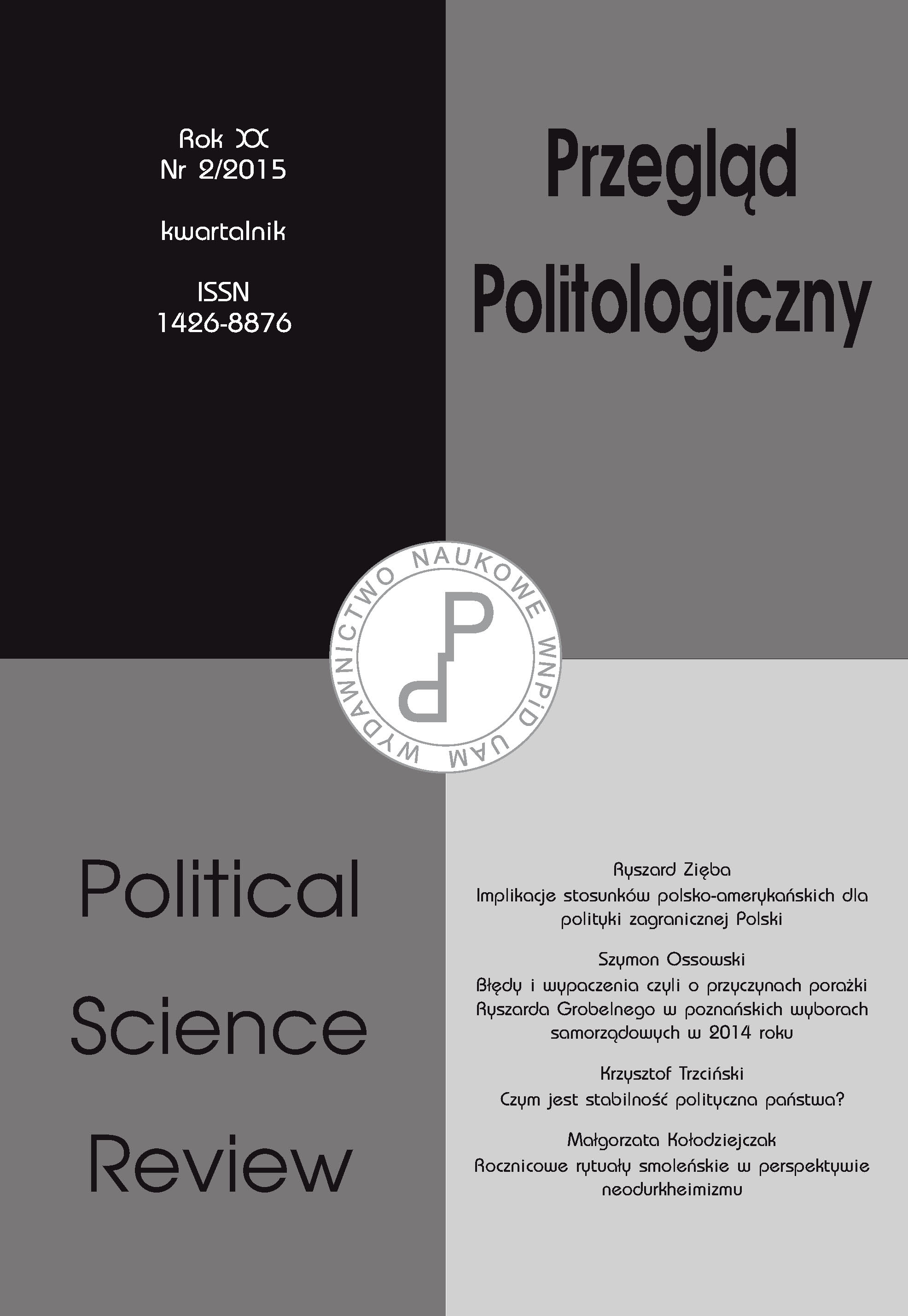
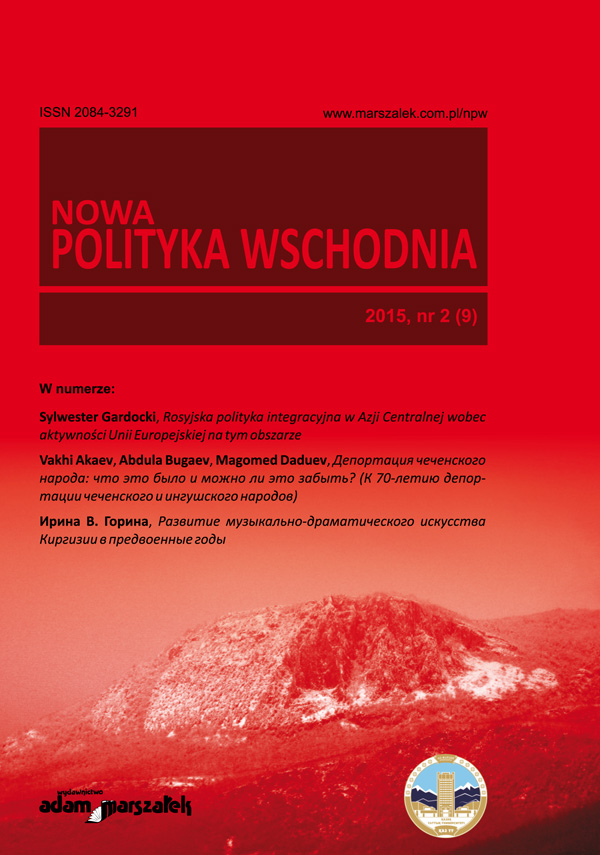
Keywords: Ukraine;Polish culture;national heritage;revindication;inter-national relations
The end of war in Europe on 8 May 1945 allowed to seek restitution of cultural property lost by Poland between 1939-1945. This task was undertaken by the Pro-visional Government of National Unity, which was created on 28 June 1945. The demarcation of new eastern borders of Poland along the so-called eastern Curzon line resulted in leaving outside the country two cultural centers important to na-tional interest of Poles – Vilnius and Lviv.In March 1945 The Committee of Experts for Restitution and Compensation in Culture and Arts was created within The Ministry of Culture and the Arts, and the Ministry of Education established the Commission for Reparations and Res-titution for Science and Schools. Their main task was to prevent looting by the so called “cultural battalions of the NKVD,” who treated the encountered cultural goods as “spoils of war”.On the basis of the resolution of the Council of People’s Commissars of the Ukrainian SSR of 18 October 1945, 577 exhibits and 50 thousand books and manu-scripts were transferred to Poland (as a gift!). The Catholic clergy could carry their fortune from the eastern borderlands of Second Polish Republic to Poland on the basis of an additional protocol to the repatriation agreement of 20 September 1945.With the resolution of 5 July 1946, The Council of Ministers of The Provisional Government of National Unity appointed a committee for the recovery of Polish cul-tural property from the former eastern provinces of the Republic of Poland, which were included in the Ukrainian SSR after the change of borders. Despite the recovery of many Polonicas, the loss of the greater part of Lviv museum collections remained a fact. Changes in the USSR began on 11 March 1985. In May 1987, 2450 Polish books from the Ossolineum collections in Lviv were given to the Polish side. At the end of November 1989, although the Soviets agreed to return Poland the Ossolineum collections in Lviv, the promise was not fulfilled. The disintegration of the Soviet Union in 1991 and regaining the independence by the former republics made it necessary to conduct negotiations on the Polish cultural heritage with each of the successors of the USSR separately - including Ukraine
More...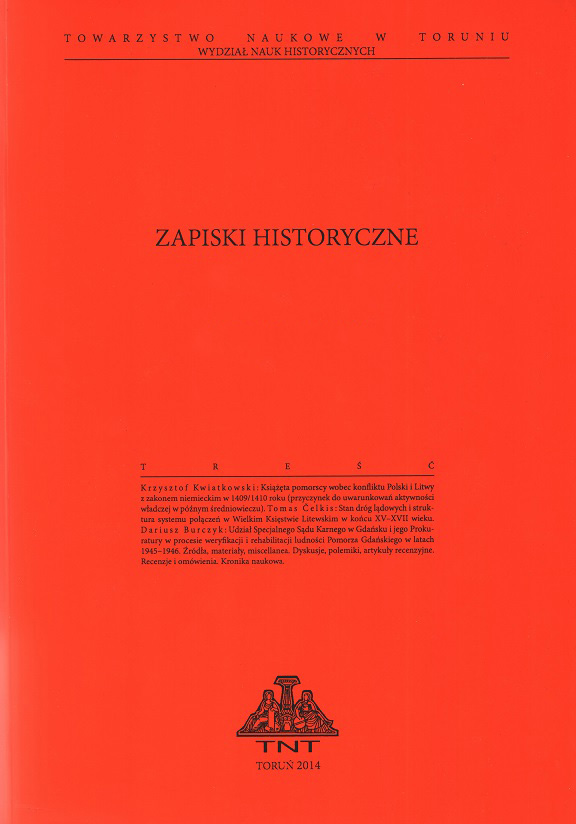
Keywords: West Prussia; Greater Poland; German Jews; emancipation; acculturation; assimilation; national identity; loyalty to the state;Polish-Jewish relations;
So far a very simplified picture of the transformation of the identity of Jews of West Prussia and Poznan land have functioned in the literature on the subject. The impulse to conduct the research on this issue became the publishing of the memories of Alfred Cohn, a typical German Jew, whose life and dramatic decisions show the complexity of the problem of identity and the sense of loyalty of the Jewish population of the territory of the Prussian partition. Alfred Cohn was close to recognizing himself as a German of the Jewish denomination. In 1920, without a shade of doubt, he decided to maintain loyalty to the German state and leave his family town Bydgoszcz, while in 1945 he decided the opposite. In order to clarify these contradictions, an analysis of the emancipation, acculturation and assimilation processes of the Jewish community of the territories of the Prussian partition of the 19th century and the first two decades of the 20th century was conducted. Subsequently, the results of this analysis were compared with studies on the identity of German Jews living in the Second and Third Reich. At least until the 1880s, the Jews of Greater Poland, and West Prussia considered themselves representatives of a separate nation, despite the already advanced process of assimilating German culture, customs and language, and showing loyalty to the German state. The assimilation reached its greatest intensity at the turn of the 19th and 20th centuries, leading to a strong integration of Jews with German society and the German state. This aggravated Polish-Jewish antagonism, especially in Greater Poland. After some of the lands of the former Prussian partition came under Polish rule, most Jews remained loyal to the German state, treating it as their homeland, and emigrated in the years 1918–1921 along with the majority of the German population. However, despite such decisions, despite the use of German as their mother tongue, and despite demonstrating German patriotism and the intense desire to blend in with German society, it is necessary to show great caution in the case of attempts to recognize the Jews of the Prussian partition only as a religious minority, although more than once they have defined themselves this way. In the Reich, Jews did not manage to merge with the German environment, either. They created their own Jewish-German cultural system. Their identity can be described as very specific, heterogeneous and shaped by contradictions and dilemmas. In the territories of the Prussian partition, the process of shaping the identity of German Jews was even more complicated as this community had to function also within the Polish society.
More...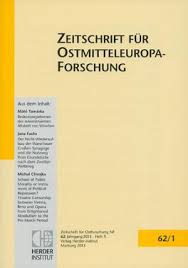
Keywords: Ukrainians; Compulsory Military Service; Polish Armed Forces (1921-1939);
Die Verfassung Polens von 1921 verpflichtete alle Bürger ungeachtet ihrer Nationalität zum Militärdienst. Deshalb dienten neben Polen, Weißrussen, Deutschen, Juden und anderen Nationalitäten auch Ukrainer in den polnischen Streitkräften, wo sie schätzungsweise zehn bis zwölf Prozent des Personals stellten. Allerdings sahen das politische und das militärische Führungspersonal Polens die ukrainischen Soldaten als nicht ausreichend loyal und vertrauenswürdig an. Deshalb waren sie in ihren Karrieren unterschiedlichen Einschränkungen, Verboten und künstlichen Hindernissen ausgesetzt. Praktisch gar nicht waren Ukrainer in der Luftwaffe, den Panzereinheiten, der Fernmeldetruppe, den Grenzeinheiten, der Feldgendarmerie und der Marine vertreten. Zahlreiche militärische Berufe und Ränge standen ihnen nicht offen. Viele Ukrainer dienten hingegen in der Infanterie und Kavallerie, die in Mittel- und Westpolen stationiert waren. Eher wenige Ukrainer erreichten die Unteroffiziers- oder Offiziersränge. Eine Ausnahme bildete eine kleine Gruppe von maximal 40 sog. „Vertragsoffizieren“, Offizieren der früheren Armee der Ukrainischen Volksrepublik, die 1920 gemeinsam mit Polen gegen die Bol’ševiki gekämpft hatte. Nach ihrer Niederlage fanden sie politisches Asyl in Polen. Dass sie in der polnischen Armee dienen durften, war ausschließlich politischen Motiven geschuldet. Bei allen institutionellen Barrieren war das militärische Führungspersonal gegenüber den religiösen Bedürfnissen der größtenteils russisch-orthodoxen oder griechisch-katholischen ukrainischen Soldaten relativ tolerant. In der polnischen Armee dienten orthodoxe und griechisch-katholische Militärkaplane und in den großen Garnisonen existierten eigene Gemeinden. Unmittelbar vor dem Zweiten Weltkrieg bemühte sich die polnische Regierung um die Polonisierung der orthodoxen Riten. Trotz aller Restriktionen entstanden keine offenen ethnischen Konflikte innerhalb der Truppe zwischen Soldaten polnischer und ukrainischer Nationalität.
More...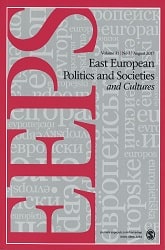
Keywords: Poland; history; 1949-1989; communist regime; international; migrations; passports;
This article presents the passport policy of communist Poland, from the late 1940s to 1980. In the late 1940s, the policy and the institutions that implemented it were given objectives and forms similar to those in the USSR. This Soviet-type policy was in principle a non-exit policy; issuing a passport was an exception that required a solid justification. However, after 1953, following the Soviet Thaw, Polish leaders gradually relaxed the restrictions on exit, which allowed for massive outflows, mainly to Germany and Israel, and for development of temporary mobility, mainly within the Soviet bloc. In the late 1950s, the Polish party restricted emigration but it did not return to the Stalin-era non-exit model. The party developed a new, complex passport policy, which favorably viewed mobility within the bloc and was selective toward travel to the West. This allowed international mobility to expand to a mass scale and become part of the lived experience of millions of Poles. The police apparatus that implemented the policy also expanded and evolved into a complex bureaucratic machinery, but to its end it combined the features of a Weberian bureaucracy with the characteristics of a revolutionary, extralegal “secular arm of the party.”
More...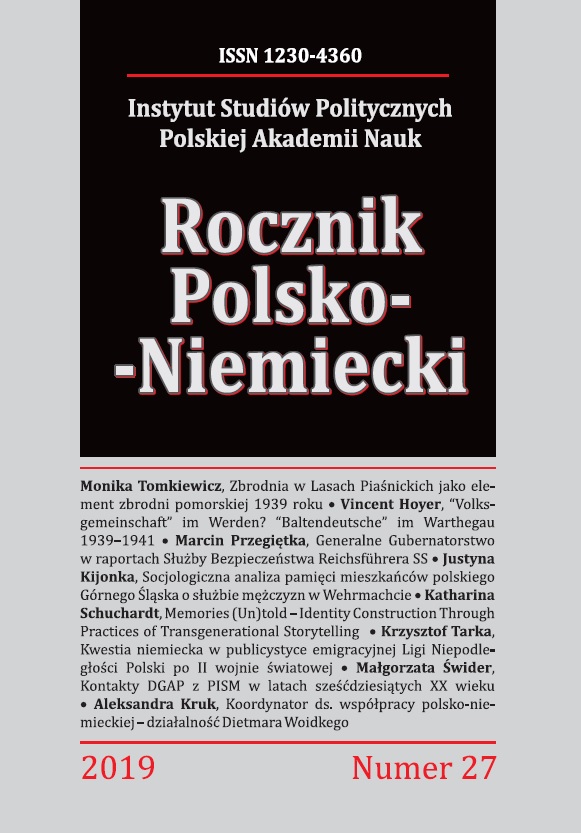
Keywords: the Pomeranian Crime of 1939; Volksdeutscher Selbstschutz; ‘Intelligenzaktion’; ‘Säuberungsaktion’; exhumation; massacre in the Piaśnica forests; Albert Forster; Richard Hilderbrandt
The term ‘Pomeranian Crime of 1939’ means acts of direct extermination carried out on the Polish population from September 1939 to the first months of 1940 by the Volksdeutscher Selbstschutz, Wehrmacht and SS divisions. It was a planned and mass campaign carried out in over 400 towns located in the pre-war Pomeranian province. This action involved capturing and arresting Poles, and selecting people to be shot from among this group. The massacre in the Piaśnica forests was the first and largest crime in Pomerania and, at the same time, one of the first on such a large scale in Europe. The executions in the Piaśnica forests began in late October 1939 and lasted until the first months of 1940. In November and December 1939, approximately 2,000 Poles and Jews from Gdynia, Wejherowo and Puck, as well as the Kartuzy and Gdańsk poviats were shot. People brought by rail from the Third Reich also died in Piaśnica. Among them were mentally ill people, opponents of Hitlerite ideology and Poles living in Germany before the war. The massacre in the Piaśnica forests was also supervised by Friedrich Class, the head of the Gdynia Gestapo, and SS-Brigadeführer Christoph Diehm, the head of the Gdynia police. SS officers from Wachsturmbann ‘Eimann’ and members of the local Volksdeutscher Selbstschutz under the supervision of the Gdynia police and the Gestapo dealt with escorting the victims to the place of execution and the execution. The bodies of those murdered in Piaśnica were buried in 35 mass graves. At the end of August 1944, the Germans began to remove traces of the executions carried out in Pomerania. In 1946, a special exhumation commission was established on the initiative of the members of the Polish Western Association in Wejherowo to determine the number of victims murdered in Piaśnica and identify unburnt corpses. On 2 April 1967, prosecutor Marian Multan issued a decision to initiate an investigation with the reference number Ds. 1/67 regarding the murder of approximately 12,000 Poles in the Piaśnica forests in the Wejherowo poviat from September to December 1939. This investigation was suspended by the Polish side on 20 September 1975 due to the impossibility of interrogating witnesses and suspects living in the West. After the end of the war, several criminal trials were carried out in Germany and Poland in which ‘the executioners from Piaśnica’ sat in the dock. In 2011, prosecutor Maciej Schulz, the then Head of the Departmental Commission for the Prosecution of Crimes against the Polish Nation in Gdańsk, reinitiated this investigation and it continues to this day. Polish researchers estimate the number of victims of the Piaśnica massacre at 12,000 to 14,000, while the Germans estimate it at about 6,000. The investigation conducted since 2011 at the Branch Commission in Gdańsk will verify this data. Numerous studies carried out in Polish and German archives have made it possible to obtain many valuable documents that significantly broaden our knowledge of this crime scene. To date, it has been possible to determine approximately 1,300 names of executed Poles and approximately 1,200 mentally ill persons transported from Germany.
More...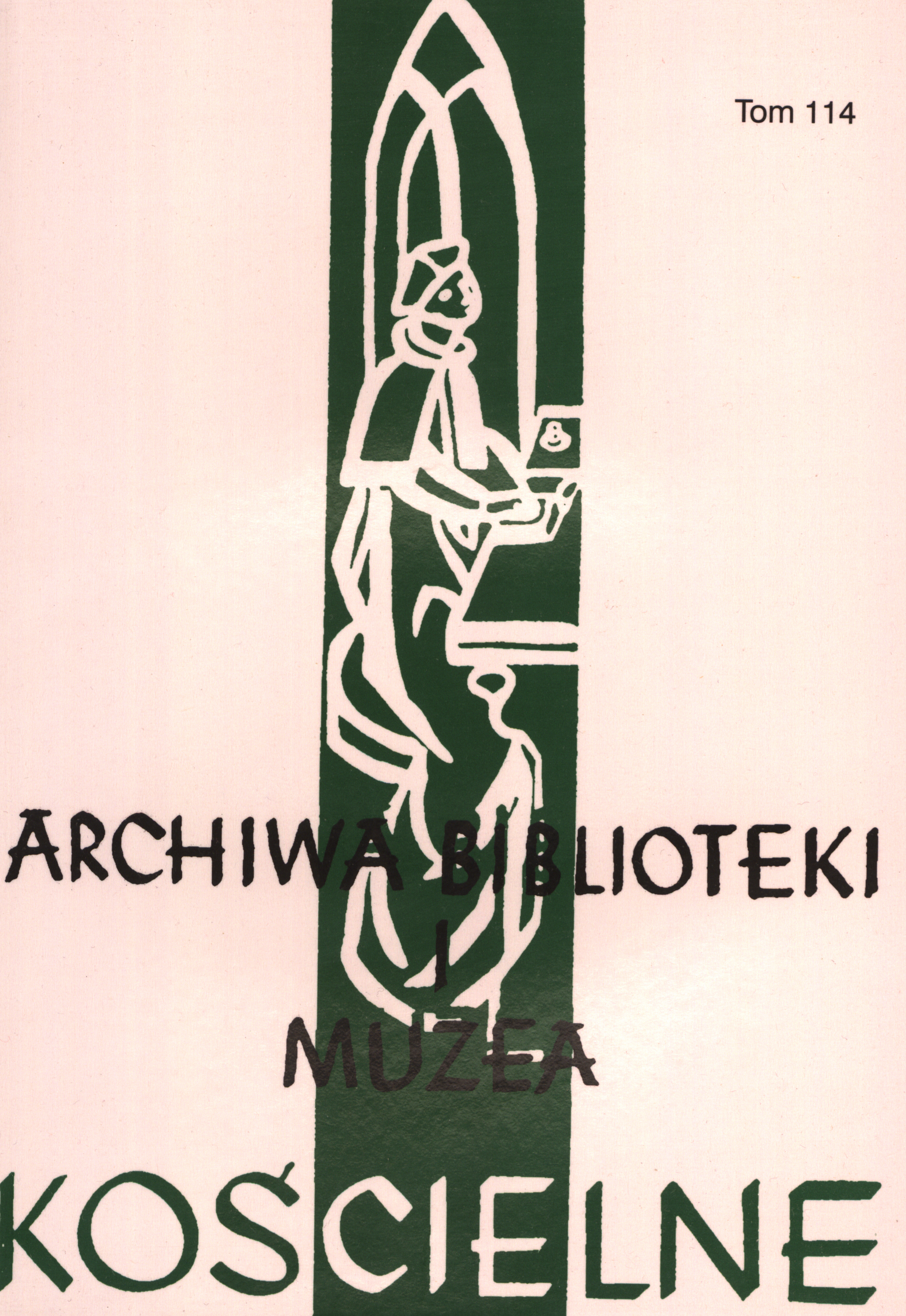
Keywords: ethics; ethical principles; archivist work; Polish archives, archivists
Adopted in 1996 at the International Congress on Archives in Beijing, the ICA Code of Ethics was embraced by the Polish archivist community without attracting any criticism. This paper seeks to justify the need to create an individual code of ethics for Polish archivists on the basis of the international one and supplement it with three additional principles. Due to the great value of the documentation stored in Polish archives, archival work should be considered a service for the state and citizens, which requires archivists to exhibit the utmost degree of commitment and responsibility. Archive staff should strive to improve the information aids that exist in the archives, especially with regard to the most valuable and accessible material, in order to adequately fulfil the individual information needs of citizens who search the archives. State archives should also be obliged to undertake actions aimed at securing valuable files owned by private persons and taking them over on terms agreed with the owners. Should this prove impossible, archives could attempt to digitalise such material with the owner’s consent and make them available on the agreed terms.
More...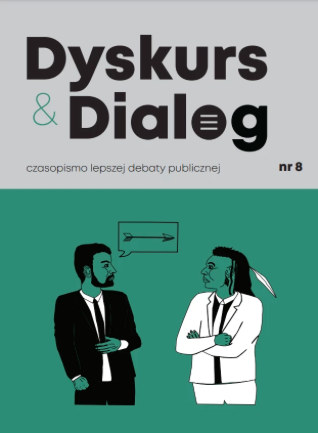
Keywords: black protest; protests in Poland; dialogue;
Reading the text by Katarzyna and Andrzej Zybertowicz became the basis for a stormy discussion during the classes on Contemporary problems of ethics, conducted in the winter semester 2021/2022 at the second-cycle philosophy studies at the Institute of Philosophy of the Nicolaus Copernicus University. It evoked a whole range of reac- tions among the participants - from intellectual inspiration, encouragement to a diffe- rent approach to some phenomena and their interpretation, through disagreement with some of the theses, to radical opposition to simplifying judgments formulated against the participants of the so-called Black Protest. We differed in our assessment of this sta- tement and assessed its elements differently; However, we were united by the conviction that despite the formulation of an invitation to discussion in the essay, the transmission of the text makes this discussion very difficult.Therefore, we decided to recognize and report those places we discovered in the essay which, in our opinion, hamper such a dialogue to the greatest extent, and indicate a possible direction for overcoming these difficulties. At the same time, we would like to suspend the very debate on the essence of the dispute, i.e. the problem of the status of legal regulations on abortion in Poland and our attitude to this issue. The overriding goal for us is to strive for the title „saving the dialogue”, to which the authors themselves invite, but which - in our common opinion, has been severely strained by the precon- ditions set out by the text in question.
More...